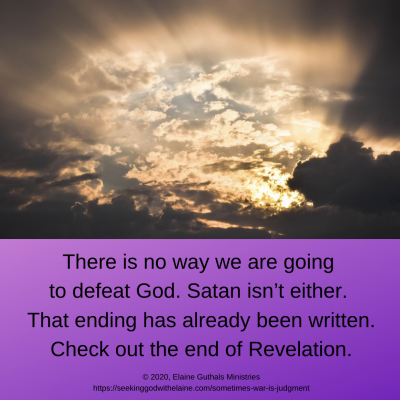We can’t avoid all war because it is sometimes God’s judgment. This devotion looks at how He uses war to punish us for breaking His laws and commandments.
Nuggets
- God’s turning against Israel had huge consequences.
- The Israelites were going to try to defend themselves, but fight turned into flight.
- One passage said that the enemies wouldn’t be a nation but marauders.
Devotions in the What I Believe series
Devotions in the Peace and War category
Sometimes War Is Judgment
Wars as a Sign of the End Times

We talked in the last devotion about how we can sometimes avoid war. Sometimes, we can’t because it is judgment from God.
Let's Put It into Context #1
I am entitling this category Peace and War – but we are only going to touch on the peace as being the opposite of war.
I am doing this because we have had many discussions about peace. We’ve said peace is an inward tranquility resulting from a balanced life with spiritual order, equity, and truth.
Glossary
War, according to the Merriam-Webster Dictionary, is “a state of usually open and declared armed hostile conflict between states or nations.”
Resource
Let's Put It into Context #2
Apostasy means not believing in the state religion or not being a Christian. Apostasy is fixed by conversion and sanctification. Sanctification is the transformation of mind, body, and soul beginning with regeneration and ending with perfected state of spiritual wholeness or completeness.
Glossary
We have to be careful – even as disciples that we fully believe in God’s sovereignty. We can’t be lured into apostasy by the worldview.
Apostasy isn’t just the unpardonable sin. The unpardonable sin is the one sin that God cannot forgive – unbelief in God. Jellie warned that it could be progressive.
Glossary
Resource
We get to apostasy when we don’t hearken and don’t do as God commands us to do. Hearken has the following characteristics: duty, gratitude, ritual, and eager and fervent attention. In Elaine-speak, we just don’t listen.
If we don’t listen, we don’t do – whatever we are supposed to do. We don’t follow God’s laws and commandments. We ignore what He is trying to teach us. We don’t do what He is calling us to do.
To read a related devotion, click the button below.
Let's Put It into Context #3
“I have abandoned my house; I have deserted my inheritance. I have handed the love of my life over to her enemies” (Jer. 12: 7 CSB)
Some see God only as a loving God. True, “… God is love” (I Jn. 4: 8 NIV).
We can’t forget God’s wrath. We’ve talked about it several times.
Glossary
God’s wrath comes out of His nature because of the need to maintain order. God’s anger is used to help get us back on His track.
God’s wrath should not be minimized. Scriptures say that “… our God is a consuming fire.” (Heb. 12: 29 CSB). Consuming. Not a nice little candle flame. A raging fire consuming. That should make us think twice before we disrespect Him.
God Turns Against Us
“I will turn against you, so that you will be defeated by your enemies. Those who hate you will rule over you, and you will flee even though no one is pursuing you.” (Lev. 26: 17 CSB)
“I will reduce your cities to ruins and devastate your sanctuaries. I will not smell the pleasing aroma of your sacrifices. I also will devastate the land, so that your enemies who come to live there will be appalled by it. But I will scatter you among the nations, and I will draw a sword to chase after you. So your land will become desolate, and your cities will become ruins” (Lev. 26: 31-33 CSB)
What? We expect us to turn against God – and He does nothing? It doesn’t work that way.
God’s turning against Israel had huge consequences. Their freedom would be taken away from them as they would be defeated by their enemies.
Not just any enemies, either. They would be subordinate to “… those who hate you …” (Lev. 26: 17 CSB).
That tells me a couple of things. They have a history because – usually – we don’t get to hate upon first introduction.
If someone hates us that much, human nature means we aren’t really too fond of them, either. Yeah, we could say that we probably hate them, too.
The Israelites sinned – and continued to sin. Oh, they could have confessed their sins and repented. Repentance is expressing sorrow for breaking God’s laws and commandments by making the commitment to changing ourselves through obedience so that we no longer do the wrong things.
But they didn’t. Look what other consequences will be felt.
- Destroy your cities (Lev. 26: 31 CSB)
- Destroy your sanctuaries (Lev. 26: 31 CSB)
- Refuse your sacrifices (Lev. 26: 31 CSB)
- Devastate the land (Lev. 26: 32 CSB)
- Be overrun by your enemies (Lev. 26: 32 CSB)
- Scatter you among the nations (Lev. 26: 33 CSB)
- Continue to pursue you (Lev. 26: 33 CSB)
It doesn’t sound like a fun time, does it? God was fixing to ruin them.
Oh, the passage goes on and on about what God is going to do to ruin them. We get the gist. You can read the whole passage by clicking on the link below.
Resource
Think of it this way. Their homes were going to be trashed. Where they would go for sanctuary was going to be trashed.
They had nowhere to go. There was nowhere to run.
They were going to have to stand and take their punishment.
And this punishment was going to last for years. The land was going to be trashed. It was going to take a while for it to come back.
What are the results of sin? Disease and suffering. “Then I will do this to you: I will bring terror on you — wasting disease and fever that will cause your eyes to fail and your life to ebb away …” (Lev. 26: 16). God can bring the results on Himself or use others to mete out the results.
Fight and Flight
“The Lord will cause you to be defeated before your enemies. You will march out against them from one direction but flee from them in seven directions. You will be an object of horror to all the kingdoms of the earth. Your corpses will be food for all the birds of the sky and the wild animals of the earth, with no one to scare them away” (Deut. 28: 25-26 CSB)
This passage was interesting to me. The Israelites were going to try to defend themselves. That is just human nature. Fight is probably going to lead.
But flight is going to take over. They were – and we are – going to try to run away.
You see, we can’t fight God. We think we can.
There is no way we are going to defeat God. Satan isn’t either. That ending has already been written. Check out the end of Revelation.
Look what this passage adds to the list of consequences.
- Derision of others (Deut. 28: 25)
- Become bird and animal food (Deut. 28: 26 CSB)
That means they were dead.

Marauders
“The Lord’s anger burned against Israel, and he handed them over to marauders who raided them. He sold them to the enemies around them, and they could no longer resist their enemies” (Judg. 2: 14 CSB)
Maclaren saw this passage as a summary of the Book of Judges. Well, longer than that, really.
Israel would sin. God would release His wrath. They would repent. Things would be okay for a little bit.
Resource
I thought it interesting in this passage that the enemies wouldn’t be a nation but marauders. To me, that means it would be like guerrilla warfare style.
Hmmm. How many ways could that play out today? Our countries can be war zones even though we aren’t at war with another country.
Did you catch the anger burned and handed over? It doesn’t sound like too much time transpired between the two.
One thing we can’t forget is that God loved the Israelites. Still does.
What they did or didn’t do didn’t change God’s love for them. If He didn’t love the Israelites, He would judge them.

Making the Connections
We might be asking why God is judging a nation for the actions of a few. Foster made an interesting observation. He wrote, “There is an amazing tendency in communities to commit the same sins … Every nation, every city, has its characteristic virtues, its characteristic sins.”
Resource
Ooo, baby. Didn’t Foster hit that nail on the head? It isn’t just a few. It is most.
We don’t just limit it to cities and nations, do we? I know of one university that has the label of the Party University.
We tend to congregate with like-minded people. If you were into fencing, would you really be hanging around with someone into football?
Yes, it is probably a safe bet that some of the Israelites kept God’s laws and commandments. He has said that there will always be a remnant.
They had to endure the consequences of the sins of the nation.
I just want to pull out Leviticus 26: 35. “As long as it lies desolate, it will have the rest it did not have during your Sabbaths when you lived there (Lev. 26: 35 CSB). How quickly did the world start to come back after this plague hit when we were in lockdown and not abusing it? It started to right itself quickly.
I see this as different. We’re talking devastation of war here. Bombs, missiles, bullets, etc. They are going to destroy the environment like the plague never did.
Making the Connections to Self-Discipline
We’ve brought up a couple of concepts that non-believers might question when we are witnessing to them.
• How can a loving God bring judgment?
• Why do true disciples feel the judgment along with those breaking His laws and commandments?
We’ve been looking at defending our beliefs when we are witnessing. That means we have to be secure enough to convince someone to accept our beliefs.
Our questions should still serve us to determine on what we need to focus.
- What does the Scriptures say?
- What do I believe?
- Why do I believe the same/differently than the Scriptures?
- What are the talking points when witnessing to a non-believer?
Related Links
I have created a worksheet of the questions above. Click on the button below to access it.
How Do We Apply This?
Why did all of this happen? Because God got a wild hair and decided to destroy His people?
No. Their sin brought these consequences on them. They did it to themselves.
Henry stressed that “God had provided sacrifices for these; not the sins they repented of and forsook, but sins presumptuously committed and obstinately persisted in.”
Resource
They had a chance to repent. They repented of some but not all. They kept committing those of which they didn’t repent.
We can’t think that we can get by if we just repent of some things. We have to repent of all sins.
They didn’t submit to God’s authority over them. They didn’t follow His laws and commandments. They held them in contempt. They didn’t think He had the authority to judge them. They broke His covenant.
Sound familiar?
We need to make sure we are following God’s laws and commandments.
In His perfect timing, God will judge those who are breaking His laws and commandments. He will judge nations as well as people. He will just us.
Father. We praise You, Lord, because Your laws and commandments show us Your love. Too many times, we break them. Too many times when we break them, we don’t repent. Lord, forgive us of our sins. Amen.
What do you think?
Leave me a comment below (about this or anything else) or head over to my Facebook group for some interactive discussion.
If you don’t understand something and would like further clarification, please contact me.
If you have not signed up for the email daily or weekly providing the link to the devotions and the newsletter, do so below.
If God has used this devotion to speak with you, consider sharing it on social media.